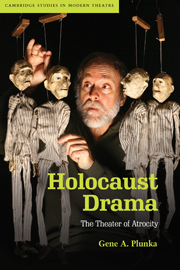Book contents
- Frontmatter
- Contents
- Acknowledgments
- 1 Introduction
- 2 Staging the Banality of Evil
- 3 Culture and the Holocaust
- 4 The Holocaust as Literature of the Body
- 5 Transcending the Holocaust
- 6 Marxism and the Holocaust
- 7 Aryan Responsibility During the Holocaust, I
- 8 Aryan Responsibility During the Holocaust, II
- 9 Heroism and Moral Responsibility in the Ghettoes
- 10 Dignity in the Concentration Camps
- 11 Holocaust Survivors in the United States and Israel
- 12 The Survivor Syndrome and the Effects of the Holocaust on Survivor Families
- 13 Holocaust Survivor Memory
- 14 The Holocaust and Collective Memory
- Notes
- Bibliography
- Index
8 - Aryan Responsibility During the Holocaust, II
Published online by Cambridge University Press: 01 July 2009
- Frontmatter
- Contents
- Acknowledgments
- 1 Introduction
- 2 Staging the Banality of Evil
- 3 Culture and the Holocaust
- 4 The Holocaust as Literature of the Body
- 5 Transcending the Holocaust
- 6 Marxism and the Holocaust
- 7 Aryan Responsibility During the Holocaust, I
- 8 Aryan Responsibility During the Holocaust, II
- 9 Heroism and Moral Responsibility in the Ghettoes
- 10 Dignity in the Concentration Camps
- 11 Holocaust Survivors in the United States and Israel
- 12 The Survivor Syndrome and the Effects of the Holocaust on Survivor Families
- 13 Holocaust Survivor Memory
- 14 The Holocaust and Collective Memory
- Notes
- Bibliography
- Index
Summary
German playwright Rolf Hochhuth's Der Stellvertreter (The Deputy) has much in common with Miller's Incident at Vichy. Both plays indict the entire Western Christian civilization for its complicity with evil, and both offer the thesis that we must not be indifferent to the world's inhumanity. Miller and Hochhuth insist that the only moral response to the Holocaust is for the individual to act responsibly devoid of divine inspiration or, as the existentialists would acknowledge, without relying upon outside influence. Not to resist or doing nothing is sinful and is equated with acquiescing to those directly responsible for inflicting cruelty, oppression, and suffering on others. As such, Miller and Hochhuth make humans accountable for their own deeds in spite of the absurd or in deference to individuals who prefer to act as automatons in mass society. Miller and Hochhuth certainly share the view that only committed individuals can change society or even history. Thus, Hochhuth should have logically been paired with Miller in chapter 7. However, The Deputy warrants a separate chapter because it stands out as being the most controversial and the most cited twentieth century Holocaust drama, having been translated into more than twenty languages; as early as 1964, Egon Schwarz noted that the play was “probably the most discussed work in the history of German drama.” Furthermore, as Eric Bentley stated about the play's production history, “It is almost certainly the largest storm ever raised by a play in the whole history of the drama.”
- Type
- Chapter
- Information
- Holocaust DramaThe Theater of Atrocity, pp. 170 - 188Publisher: Cambridge University PressPrint publication year: 2009

